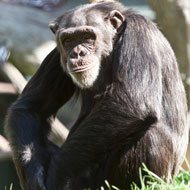
Social relationships ‘can significantly impact our lives’
Male chimps that get along well with others tend to live longer than their less amiable peers, according to new research.
A team of international scientists studied more than 500 captive chimpanzees to find out which aspects of personality are associated with longevity.
Personality and survival data indicates that evolution has favoured more affable males. Those who formed strong social bonds by being sensitive, protective and co-operative, outlived their more aggressive counterparts.
Researchers also found that female chimps that demonstrated openness - that is, those that exposed and adapted to change more readily - were more likely to live longer.
Contrary to studies on humans and other primates, being more extroverted, conscientious or neurotic had no impact on chimp longevity.
Extroversion is often associated with longer life in other non-human primates, while in humans, conscientiousness and neuroticism are linked with longer and shorter lifespans respectively.
These findings, which were published in eLife, suggest that links between personality and lifespan in humans may not be entirely explained by inherent characteristics - but lifestyle may play a greater role.
Drew Altschul, postdoctoral fellow at the University of Edinburgh, commented: “Studying the personality of chimps – one of our closest biological relatives – suggests that the quality of our social relationships can significantly impact our lives.”
Image © Lincoln Park Zoo



 The Veterinary Medicines Directorate (VMD) is inviting applications from veterinary students to attend a one-week extramural studies (EMS) placement in July 2026.
The Veterinary Medicines Directorate (VMD) is inviting applications from veterinary students to attend a one-week extramural studies (EMS) placement in July 2026.